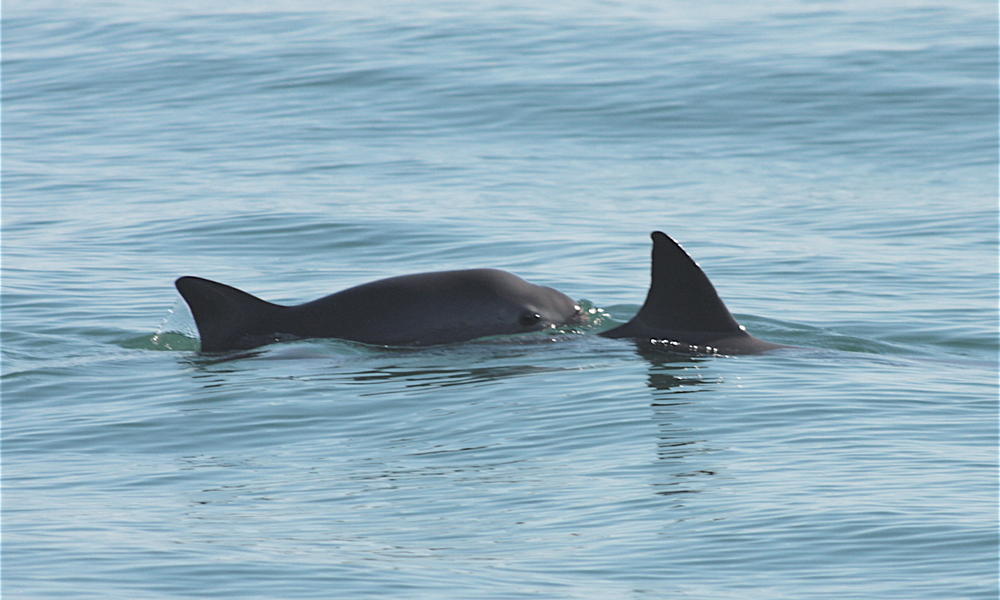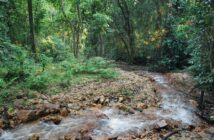2017 has been a year full of crazy news, especially in the environmental realm. In the whirlwind of stories and headlines, a new one is about to emerge: “Marine Mammal Forced to Extinction”. With such somber stories, it is ever important that we use them as fuel for our hopeful navigation of our world. Let’s use the hurdles to encourage us to jump higher!
The plight of the vaquita is enough fuel to propel all of us into action.
The vaquita porpoise dangles at the edge of extinction because of human activities. Last summer, a survey revealed that there were around 30 vaquitas left in the wild. Since then, at least 8 vaquitas have been found dead. These are only the recorded deaths, and it’s estimated that there are more undiscovered.

Photo via AwesomeOcean
The vaquita is only found in the Gulf of California, which also happens to be the habitat of the highly sought after totoaba fish. The totoaba, which is also listed as endangered, is illegally fished with gillnets. The gillnets are small enough to capture other fish and, more importantly, the critically endangered vaquita.
Totoabas are caught for their prized swim bladders. These swim bladders are worth hundreds of thousands of dollars in China, as the specific fish’s organ is thought to have medicinal qualities. While Mexico enacted a 2 year ban on gillnets, the totoaba fishing has only increased as the profits skyrocket. Fishermen were outraged at the gillnet ban and the small payments by the government did nothing to replace their profits from fishing. Without being able to sustain their livelihoods, the illegal totoaba fishing has never ended.
The vaquita’s survival depends entirely on incorporating community centered conservation to address both human and animal needs. A recent documentary highlights this importance and discusses how Mexico’s efforts have done little to curb the vaquita’s demise.
In a Capitol Hill briefing, titled “Wildlife Whistleblowing: A Game-Changer in the Enforcement of Wildlife Trafficking Laws,” the vaquita’s situation was the center of attention. The proposed idea from this briefing is that by providing whistleblowers rewards (ie. people who tell authorities of illegal actions), totoaba and other wildlife crimes could be stopped.

Photo via WWF
“Fishermen who wish to comply with regulations feel they are being undercut when illegal fishermen [using gillnets]operate without punishment,” said Stephen M. Kohn, an attorney and advocate for whistleblowing.
Kohn cited a lack of law enforcement in Mexico as the key driver of the vaquita’s disappearance.
A collaborative panel of Mexican and American scientists is expected to declare that conservation efforts for the vaquita have largely failed. Some scientists believe there may be only two or three vaquitas left, although this could take years to confirm. The vaquita’s situation is extremely dire, but luckily, people are taking notice.
Recently, Leonardo DiCaprio took to twitter (and instagram) to express his concerns for this rare species. He urged his followers to help him and World Wildlife Fund (WWF) save this adorable porpoise.
The vaquita is the most endangered marine mammal in the world. Join me + @World_Wildlife and take action. https://t.co/sB80PCeTG9 pic.twitter.com/UQMomVkvlC
— Leonardo DiCaprio (@LeoDiCaprio) May 11, 2017
WWF is calling on Mexico to extend their current ban on gillnets, which is the leading cause of vaquita deaths. They also want Mexico to more strictly enforce fishing laws and consequences for those who break them. Mexico’s president, Peña Nieto, responded to DiCaprio’s plea and assured that the Mexican authorities were doing all that they could to help save the species.
Mexico’s government is making a major effort, doing what should have been done decades ago to save the Vaquita Marina.
— Enrique Peña Nieto (@EPN) May 12, 2017
While Nieto has promised to protect the vaquita, new options are being explored. Navy marine dolphins are being utilized to locate the remaining vaquitas and relocations to captivity are possible. While conservationists would rather keep them in the wild, captivity may be the vaquitas last hope.
Whatever options are chosen, let’s not let 2017 be the year we lost the vaquita.
You can act now to save the vaquita! Help WWF encourage President Nieto to permanently ban gill net fishing.
You can also read more about the vaquita’s story here.






